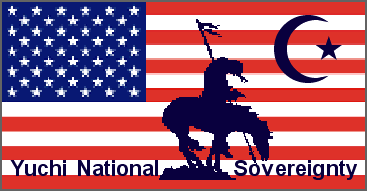|
Modern myths of meaning of "Yuchi" in Yuchean
It is with a cautious humility that I raise the question of the century old, quasi-established meaning of the term "Yuchi." Modern consensus has it that this term by which the Tsoyaha people are widely known and sometimes spelled "Euchee," comes from the Uchean Yu Tci -- meaning "seated at a distance" or "faraway." This origin theory was posited by Frank Speck in 1909. While it is true that the various words for distant (yonder, far, & faraway) often begin with the phoneme yu, so do some other terms with quite desperate meanings. An analysis of all the words with this phoneme was undertaken in an attempt to resurrect the root meaning of it.
Several major ideas begin with the phoneme Yu, and many more carry it as a subordinate modifier-morpheme. These include besides "distance:" "house/home," "squareground," "ill/sick," "fly," "high/up," "myth/story, " "pipe," "lie/fool," "strange/weird," "tie on," "exchange" & "long ago." It is not readily clear that these things share any common concept. It is clear that the meaning of the morpheme Yu is subtle, and a bit obscure. However, I might posit that they all have a measured significance wherein the key idea is "import or significance" as in great, large or special. Yu would then be a root idea, like Go/co meaning man or S'a meaning earth, but herein Yu would flag the largeness or significance. This can be seen in the word stago (far) and yustago (very far). It remains clear from the diverse use of the morpheme Yu that it cannot in all likelihood be readily interpreted as "far," anymore than "up" or "home" or even "sick."
Yuchi words for "far" include yukho, hege'fa, hegehe'a (Lit: place-end), stago, yustago, yuhe'a (yonder-Lit: house-end), yuxke (yonder). In Yuchean the word chi is one form of the verb "to sit." A cursory understanding of the language could easily cause one to surmise that Yu-chi might refer to "sitting far off." However a more thorough knowledge of the broad spectrum of the usage of the morpheme Yu, ought to give pause here. After all we have yuba (high, mountain) yuda (pipe), yuhe/yuti (house/home), yude (fly), yu'de (story), yu'a'e (squareground), yukwane (tie on), yuhu'lene (exchange), and yuxe (sick) -- all of which that have nothing to do with far-ness. When you add that the Yuchi elders insist that it is not Yu-chi, but Yudji, and that early records also often record it as "Ugee," and "Hughee," this opens up greater doubt still as to the Speck theory of origin for the word "Yuchi." While several Yuchi speakers gave Speck tacit approval of this theory, Frank Speck did not have access to the most knowledgeable of Yuchi Elders. In light of this argument, Speck's theory must be viewed with great skepticism, and so far as it has been widely embraced -- it should be viewed as mythology.
While it is still possible that the word is not Yuchean in origin at all, its wide use by the Yuchi, the Cherokee (Yutsi), Muskogean (Yutcu'lke), as well as scholars suggests that it might just be a self-appellation. Yuchi elders insist that it is composed of the morphemes Yu, dji, and ha and Chief Sam Brown, Jr. insisted that the meaning was "earth-sky people." Certainly, the Yuchean words for "high/up" and "fly," could support such a claim, but both dji or chi are hard to cast as references to the earth, and "sky" has a word: hob'o.
Based in the knowledge of the elders, I would argue that Yudji was originally a title. Dji, like yu, has several uses, but are not as diverse. It is part of the verbs "be" and "go" as well as a past tense indicator. Since I do not believe it is a tense indicator here, I would argue that the intepretation should be something on the order of Yu (significant) dji (being) ha (people) or "people that are significant or important," and that it was originally used as a title. This preserves the sense that Chief Brown was conveying, as well as the most likely intepretations of the individual morphemes. (Ha is well understood to be used as a plural suffix for "people.") It is also consistent with the emerging view that the Yuchi played a significant role in the commerce and administration of the protohistoric culture in the Southeast.
There is much less question about the use of Tsoyaha. Tso (Sun or sacred) ya (fire) ha (people) is often used with Yuchi or alone as the self-appellation of our people. It is broadly interpreted as "Children of the Sun," as we are taught that our original ancestors came down from the Sun, bringing our culture, and becoming priests to the peoples of the Southeast.
We may never know the explicit etymology of the name, "Yuchi," but a better understanding of the Yuchi language can only give us a better understanding of the people and the culture. It is quite clear that the Yuchean language and the culture are intimately interwoven and evolved together -- unraveling one will reveal the other.
© 2010 David Hackett (Woktela)
|
|
